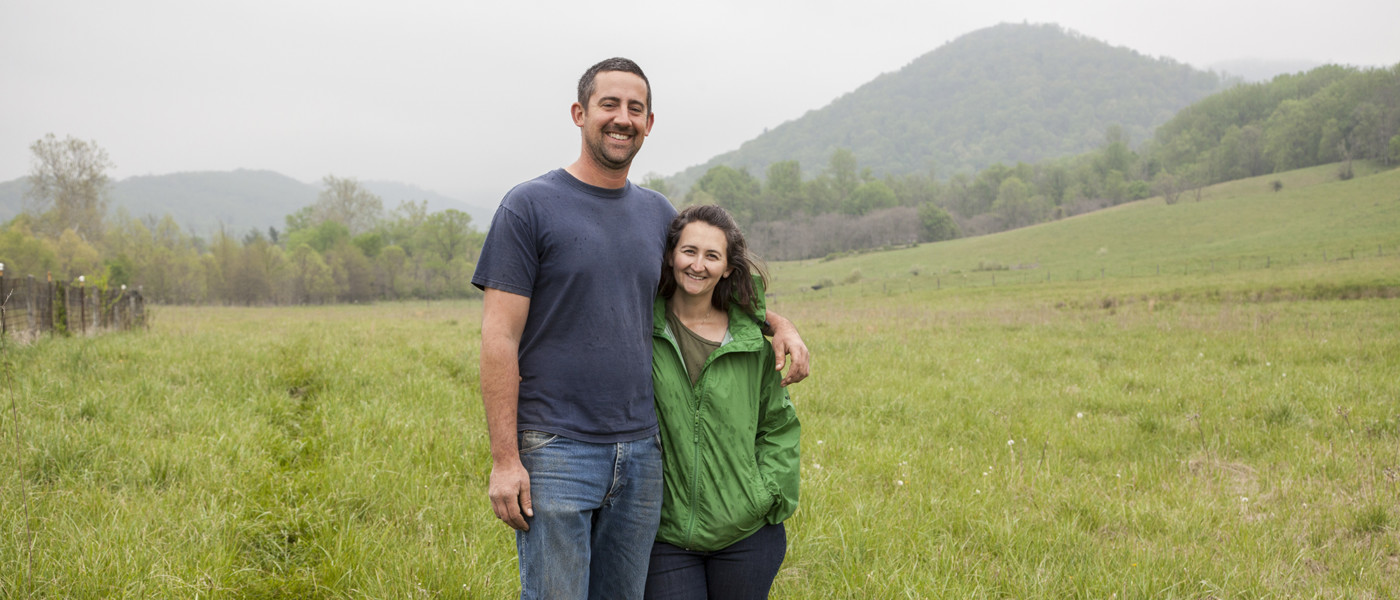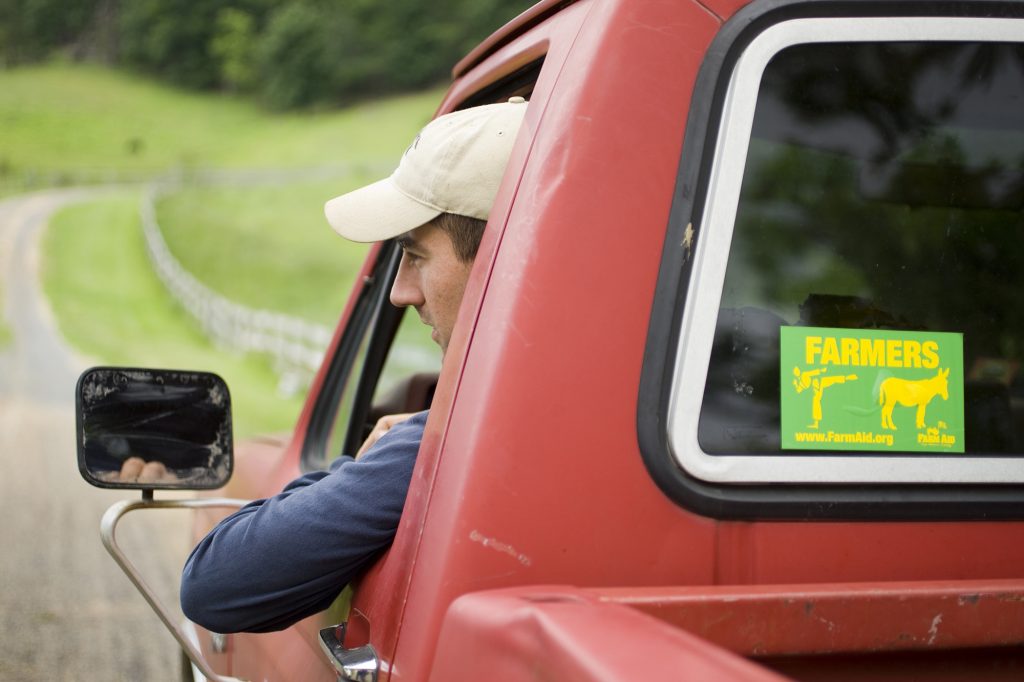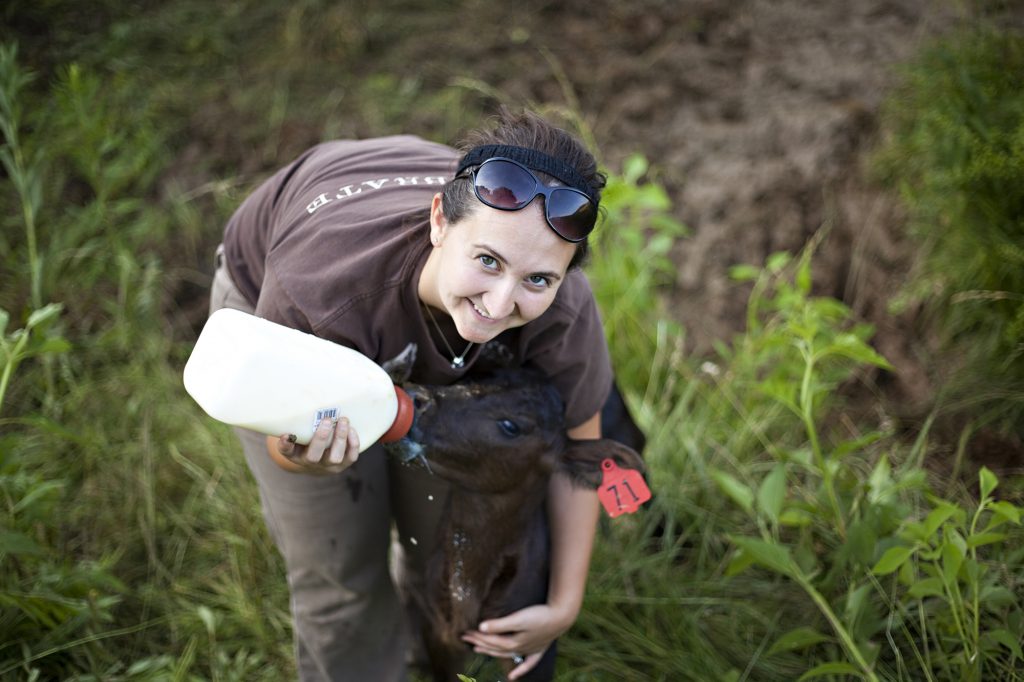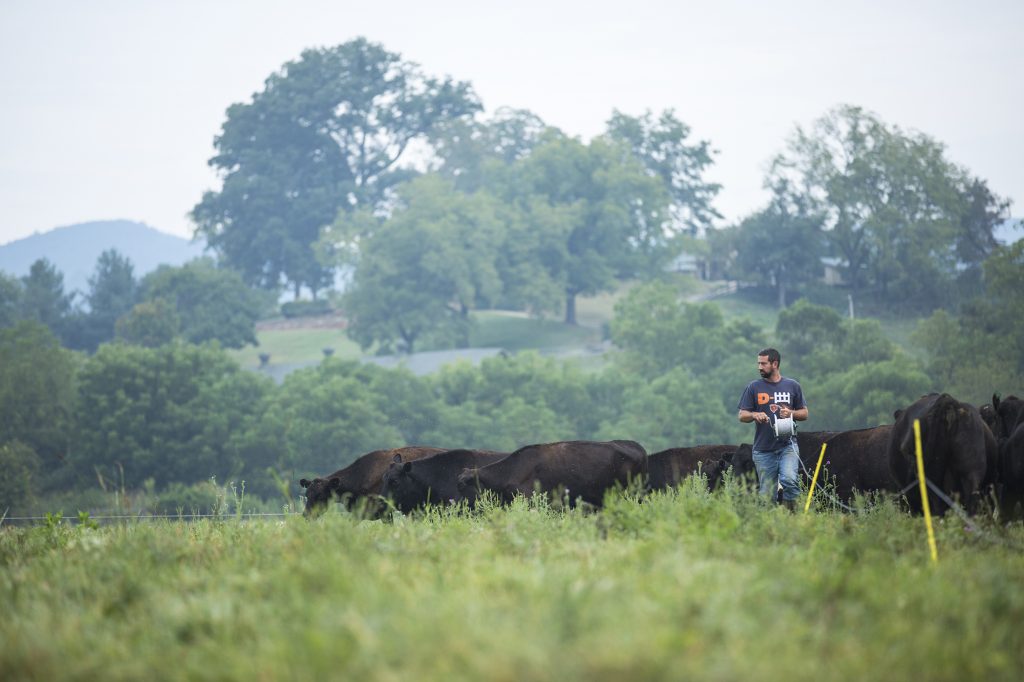Molly and Mike Peterson both grew up in rural communities in Illinois–Molly on a farm, and Mike frequently visiting his grandparents’ dairy. Neither initially planned to be farmers, and in fact trained for other careers. But for both, their family traditions and heritage, combined with their education and training, led them back to the farm. Today they raise 400 head of cattle, lamb and hogs on nearly 850 acres of pasture they lease across five farm properties in Rappahannock County, Virginia. They also operate their own farm store in Sperryville’s river district, where they sell the meat they raise as well as products from local farmer friends and local craft food and drink.
In Mike’s family, holidays and birthdays were celebrated on his grandparents’ farm, and he has precious memories of the fresh-picked taste of his grandmother’s pies and meals fresh from her garden. This strong focus on food and family led him to culinary school after high school. Culinary school led him to well-known kitchens in Aspen & Basalt, Colorado. “As you work your way up through kitchens, you get more involved in the sourcing of food—where it comes from and how it is grown,” Mike explains. “I read Michael Pollan’s The Omnivore’s Dilemma and subscribed to The Stockman Grass Farmer, and the more I read, the more I wanted to support the kind of farming we’re doing now.”
Mike’s high school sweetheart Molly joined him in Colorado where she then attended photography school and began her career as a professional photographer. They married while in Colorado and the following year, Mike’s desire to get more involved in agriculture led them to Virginia in 2008. Mike worked first as a butcher at the prestigious Inn at Little Washington before moving on to intern at Mount Vernon Farm, one he passed on the way to work each morning. Mike began interning there to learn more about livestock management and intensive pasture grazing to strengthen his career as a chef. But not long after he began on the farm, he knew he wouldn’t be headed back to a kitchen anytime soon. After the internship, Mike was hired on to manage Mount Vernon Farm. Molly also became an employee of the farm, managing the bookkeeping and marketing, using her photography skills to beautifully tell the story of the eighth generation farm.
In October 2013, the opportunity arose for Molly and Mike to give even more to Mount Vernon Farm. Mount Vernon Farm’s owner, Cliff Miller, had been looking for a young family to take over management of the farm and continue his family’s tradition—since 1827—of raising crops and livestock on the land. But he was looking for a special couple who shared his holistic approach to agriculture, building the health of the soil, water and animals each year. When Cliff’s tenure as caretaker of the farm began in 1998, he underwent a transformation and education in having “a long-term association with the land,” as he puts it. He began to see the farm as a “grassfarm,” and he focused on the whole health of the farm—of the soil, the water and rivers running through his property, the crops and animals, his family and his community. He recognized this commitment in Mike and Molly, and offered them a long-term lease of the land. Mike and Molly also purchased Mount Vernon Grassfed, the 100% grass fed & grass finished beef & lamb and pastured pork business Cliff had operated for over a decade.
“This is not a job…. It’s our life. We are part of a community. What’s important to me now is the growth of our community—that’s made up of our farm, our store, our customers.”
With fresh, young faces at the helm, the farm and the meat business underwent a name and branding change, becoming Heritage Hollow Farms. Mike and Molly are grateful for the opportunity afforded by the Miller family. Because the next generation of Millers is not currently interested in farming, they got a chance to become farmers and stewards of this beautiful farm nestled at the base of Shenandoah National Park.
Accessing land is one the biggest challenge for young farmers, and farmers like Mike and Molly are finding creative ways to patch land together and provide that care and labor so that a retiring farmer like Cliff doesn’t only have the choice of selling the family farm or letting it lie fallow. Molly explains how crucial this relationship is, “For us to buy our own property, we’d both have to have full-time jobs. And that wouldn’t allow us the time to farm.”
As it is, they’re both working multiple jobs, between operating the farm and farm store. Molly says, “It’s possible now because we don’t have kids yet. And maybe we’re nuts. And we genuinely love what we do.” In addition to her role as a farmer, Molly also continues her photography business (in fact, while her photos will appear on the video screen that is the set for the Farm Aid stage, she’ll miss the concert because she has a wedding booked that day!). Molly says, “I’m lucky because I can combine my two jobs. A lot of my client work is food and farm related. If I were, say, an attorney, I wouldn’t have the option to combine that work with the farm in the co-creative ways I am able to now. Whereas with photography, Mike and I can work together and create opportunities to teach people about agriculture and food.”
Molly’s particularly enthusiastic about social media’s role in bringing agriculture to everyone. “Social media has helped evolve the conversation with the customer. Five or six years ago, we used to get the same question over and over: ‘Are you organic?’ Now the questions have gone a couple layers deeper,” she says. “Instagram shows people what we do and how we do it. It contributes to a transparency and trust that we didn’t have before. It allows an opportunity to let us show you, not just tell you.”
As is the case with most farms, Mike says, “There is no typical day on the farm. Morning chores take three or four hours. Since our land is spread out, we have to drive to each property. There’s a lot of fencing work, since we do rotational grazing. The pigs are pretty self-sufficient, and don’t need new paddocks as often as the cattle. The cattle get new grass every day so we’re moving the portable fence each day as the pasture rotation/weather/palatability of the grasses allows: it is often a moving target.”
In the busy season, Mike makes a weekly trip to one of the local slaughterhouses, one within 35 minutes and the other within an hour’s drive. Here’s another way that Mike and Molly have been fortunate, as access to USDA certified processing facilities for small-scale farmers can be a huge challenge. Later in the week, Mike returns to pick up the frozen, wrapped cuts that will be sold at their farm store, to customers who purchase whole and half animals, and to a few local restaurants.
Mike’s cousin, Matt, has recently moved to the area to help with the on-farm work and his girlfriend Jodi is also an employee of Heritage Hollow Farms, helping out in the store. Molly says, “Jodi brings their young son to work, and some of the neighborhood kids come to help out in the store, too. They even practiced their math at school so they could help more in the store and have been along during some of our cattle moves and chores. Sure, it slows things down a little, but we want our farm to be family friendly, and most people need to slow down a little anyway.”
The biggest challenges Mike and Molly face are access to cash flow and capital. Mike says, “We have to get creative with our growth plan. It forces you to think outside the box, otherwise we wouldn’t still be in business. Heritage Hollow Farms recently won a $50,000 prize from AT&T in a nation-wide contest based on their ability to be agile as small business owners. While it seems like a huge amount of money, Molly explains she and Mike are still working on how to spend that money wisely, likely using it to pay off some farm debt and starting new projects.
The best thing about their life and work as farmers? “Definitely our community,” Molly says. Mike agrees, but he says, “This would have been a different answer for me if I’d answered a few years back, but now it’s definitely community.” His voice takes on emotion as he says, “This is not a job…. It’s our life. We are part of a community. What’s important to me now is the growth of our community—that’s made up of our farm, our store, our customers.”
Mike and Molly agree what’s crucial is that their “agricultural practices are of benefit to the land, and that they’re growing healthy food.” They celebrate the fact that at their store, their customers are spending their hard earned money on products produced by the work of their friends and neighbors.
“I don’t think there’s a better time to be young farmers.” Mike says. But you don’t have to take Mike’s word for it. Let Mike and Molly show you! Looking at the farm’s Instagram account, filled with gorgeous photos of Heritage Hollow Farms nestled in amongst the Blue Ridge Mountains, happy animals, and every once in a while a selfie of a beaming Molly and Mike, it’s transparently clear. These two farmers have made all the right transitions, and in doing so they’re contributing to the health and longevity of the farm that has been entrusted to them and the community they are bringing together with good food.








